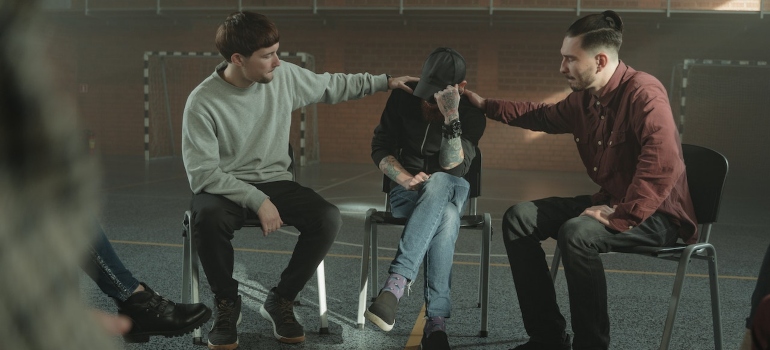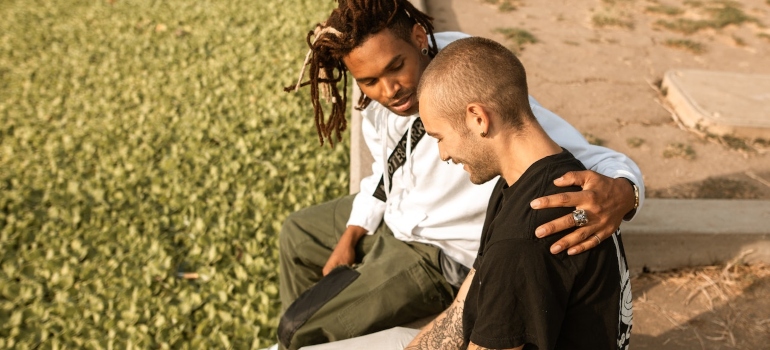Recovery from addiction or any other mental health issue is a challenging and long journey. It requires a lot of support, patience, and understanding from friends and family. Supporting a friend in recovery can be a rewarding experience for both the person in recovery and the friend offering support. However, it can also be difficult, especially if you are unsure of what to do. In this blog post, we will explore various ways in which you can support a friend in recovery.
9 Ways to Support a Friend in Recovery
Supporting a friend in recovery requires a combination of empathy, education, patience, practical support, and a supportive environment. This can include listening to them, offering encouragement and celebrating their progress, educating yourself about the recovery process, respecting their boundaries, being a good role model, encouraging them to attend support groups or therapy, or visiting Harmony Ridge Recovery Center WV, and creating a safe and non-judgmental space for them to heal and grow. By taking these steps, you can help your friend on their journey to recovery and provide them with the support and care they need to overcome their challenges and finally have a healthy, fulfilling life.

1. Educate Yourself About the Recovery Process
The first step in supporting a friend in recovery is to educate yourself about the recovery process. This will help you to understand what your friend is going through and how you can best support them. There are many resources available online and in local communities that can help you learn about addiction and recovery. You can also speak to a therapist or counselor at the alcohol rehab center in Clarksburg WV who specializes in addiction to gain a better understanding of the challenges your friend may be facing.
In addition to researching addiction and recovery, it may also be helpful to educate yourself on the nature of addiction itself. Understanding the biological, psychological, and social factors that contribute to addiction can help you understand why your friend is struggling and what they need from you. It can also help you recognize triggers and warning signs, so you can be proactive in offering support. Furthermore, educating yourself about addiction and recovery can help reduce the stigma and shame often associated with these issues, which can in turn help your friend feel more comfortable and supported in their recovery journey.
2. Listen and Offer Empathy
One of the most important things you can do to support a friend in the alcohol rehab center in Buckhannon WV is to simply listen to them. Allow them to talk about their feelings, struggles, and progress without judgment. Let them know that you are there to support them and that they can talk to you whenever they need to. Additionally, offer empathy and validation for their experiences and feelings. This can help them to feel heard and understood, which can be incredibly healing for someone in recovery.

It’s important to remember that everyone’s journey is different, and there is no one-size-fits-all approach to recovery. By offering empathy, you are letting your friend know that you care and that you are there to support them. However, it is important to also maintain boundaries and avoid enabling addictive behavior. A supportive and non-judgmental approach can make all the difference in helping a friend in recovery.
3. Be Patient
Recovery is a very long and challenging process, and it is important to be patient with your friend. They may struggle at times, experience setbacks, or feel overwhelmed. Your role as a friend is to offer support, encouragement, and understanding, even during the most difficult times. If your friend is in the beginning stages of dialectical behavior therapy for addiction, you might still find it difficult to talk them out of turning back to drugs. Nevertheless, you should focus on being a positive and supportive presence in their life.
It’s also important to be patient with your own expectations. Supporting a friend in recovery can be emotionally taxing, and it’s important to set realistic expectations for yourself and give yourself time to recharge and take care of your own well-being. It’s also important to recognize that recovery is a lifelong journey, and your friend may continue to face challenges even after they have achieved significant progress. It’s important to be there for them in the long term and offer support, understanding, and encouragement as they navigate the ups and downs of recovery.
4. Offer Practical Support
Offering practical support is a key way to help a friend in recovery. This can involve helping with everyday tasks, such as transportation to therapy appointments or support group meetings, or providing a safe and supportive environment for your friend to rest and recharge. You can also offer to run errands, help with meal preparation, or offer to be a sounding board as your friend works through their challenges. If they have problems with sleep, you can offer to go with them to Ambien rehab. Practical support can be especially important in the early stages of recovery, when your friend may be struggling with the physical and emotional demands of treatment.

In addition to offering practical support, you can also help your friend by being a positive influence and encouraging them to engage in self-care activities. This can involve encouraging your friend to exercise, eat well, get enough rest, and participate in activities they enjoy. You can also offer to participate in these activities with them, which can help build a sense of camaraderie and support. It’s also important to be mindful of the type of support you offer and to make sure it aligns with your friend’s goals and needs. For example, if your friend is in recovery from an addiction to drugs or alcohol, it may not be helpful to offer them alcohol or drugs as a way to cope with stress or emotional challenges.
5. Encourage Them to Attend Support Groups or Therapy
Encouraging your friend to attend support groups or therapy is a crucial part of supporting them in recovery. Support groups and therapy provide a safe and supportive environment where your friend can share their experiences, receive guidance and advice, and connect with others who are going through similar challenges. These programs can help your friend gain a sense of control over their addiction and provide them with the tools and strategies they need to maintain their sobriety.
It’s important to understand that everyone’s recovery journey is unique and that different approaches work for different people. Encourage your friend to try different support groups or therapy programs to find what works best for them. Whether they choose to go to cognitive behavioral therapy for substance use disorders or something else is up to them. You can also offer to attend support groups or therapy sessions with your friend, which can help them feel more comfortable and supported. Additionally, consider researching local resources, such as recovery programs, support groups, or mental health resources, and share them with your friend to help them find the support they need.

Remember, recovery is a lifelong process and you must be understanding as your friend navigates the ups and downs of recovery. Encouraging them to attend support groups or therapy can provide them with the resources and support they need to build a strong foundation for recovery and maintain their sobriety.
6. Celebrate Their Progress
Recovery is a journey filled with ups and downs, and it is important to celebrate your friend’s progress and successes along the way. Whether it’s a small accomplishment or a major milestone, acknowledge and celebrate their progress. This can help them to feel valued and appreciated, which can be a significant boost to their self-esteem and confidence.
Celebrating progress also helps to maintain a positive attitude and provides a sense of hope for your friend in recovery. By recognizing and acknowledging their progress, you are showing that you are there for them and that you believe in them. It’s important to celebrate both big and small victories, such as maintaining sobriety for a certain amount of time or reaching a personal goal. Even if it’s just entering a treatment process, like benzo addiction treatment, for example. Celebrating progress can help to build resilience and foster a sense of pride and accomplishment in your friend, which can be essential to their ongoing recovery journey. Encourage your friend to take time to reflect on their progress, acknowledge their strengths and challenges, and celebrate their progress along the way.
7. Respect Boundaries
It is important to respect your friend’s boundaries and understand that recovery is a personal journey. Your friend may not want to talk about their recovery or may need some time and space to focus on themselves. Respect their wishes and understand that this is a part of the process.

Additionally, it’s important to respect your friend’s decision-making process when it comes to their recovery. Whether they choose an alcohol rehab center Point Pleasant WV has to offer or a detox center in another place, you should respect that. Your friend may choose to pursue certain treatments or therapies, or they may opt for alternative methods. Whatever their choices may be, it’s important to support and respect their decisions. Avoid judgment and criticism, and instead, focus on being a supportive and understanding friend.
Encourage your friend to seek the help and support that they need, but also recognize that it is their choice and decision. Your friend’s recovery is a journey that they must take at their own pace, and respecting their boundaries is a crucial aspect of being a supportive friend. By doing so, you are demonstrating your care and compassion, which can be an important source of comfort and strength for your friend during this challenging time.
8. Be a Good Role Model
As a friend, you can have a significant impact on your friend’s recovery. One way to do this is by being a good role model and avoiding drugs and alcohol while engaging in healthy activities and habits. According to the National Institute on Drug Abuse, understanding the science of drug abuse and addiction can help support this positive behavior. Your friend will look to you for guidance and support, so it is important to set a good example.
Moreover, being a good role model also involves being honest and open with your friend about your own experiences and struggles. If you have struggled with substance abuse or addiction yourself, sharing your story can be a powerful tool in helping your friend to understand that they are not alone and that recovery is possible. Your experience and the lessons you have learned can provide valuable insight and support for your friend in recovery. Additionally, being a good role model means being there for your friend, even when things get tough. Make sure to offer a listening ear and a supportive shoulder when needed. By being a good role model and demonstrating the positive aspects of recovery, you can help your friend to develop a more positive outlook and a greater sense of hope for the future.
9. Provide a Supportive Environment
Creating a supportive environment for your friend can be incredibly helpful in their recovery. Since they may not be in an alcohol rehab center in Parkersburg WV all the time. This means being there for them and providing them with a safe and non-judgmental space to talk and heal. It can also mean avoiding triggering situations, such as parties where drugs or alcohol are present, or places that are associated with their addiction.

In addition to avoiding triggering situations, you can also help to create a supportive environment by being actively involved in your friend’s recovery journey. Offer to go to support groups or therapy sessions with them, or to participate in healthy activities together, such as exercise or hobbies. Your presence and support can be a source of comfort and encouragement and can help your friend to feel less isolated and more connected to others.
To Sum Up
Supporting a friend in recovery is a crucial part of friendship. By being there to support a friend in recovery, understanding their journey, and encouraging their progress, you can play a significant role in their recovery. Remember to respect their boundaries, be a good role model, and encourage therapy and support groups. Your support and encouragement can have a lasting impact on your friend’s life and journey toward a healthier future.



